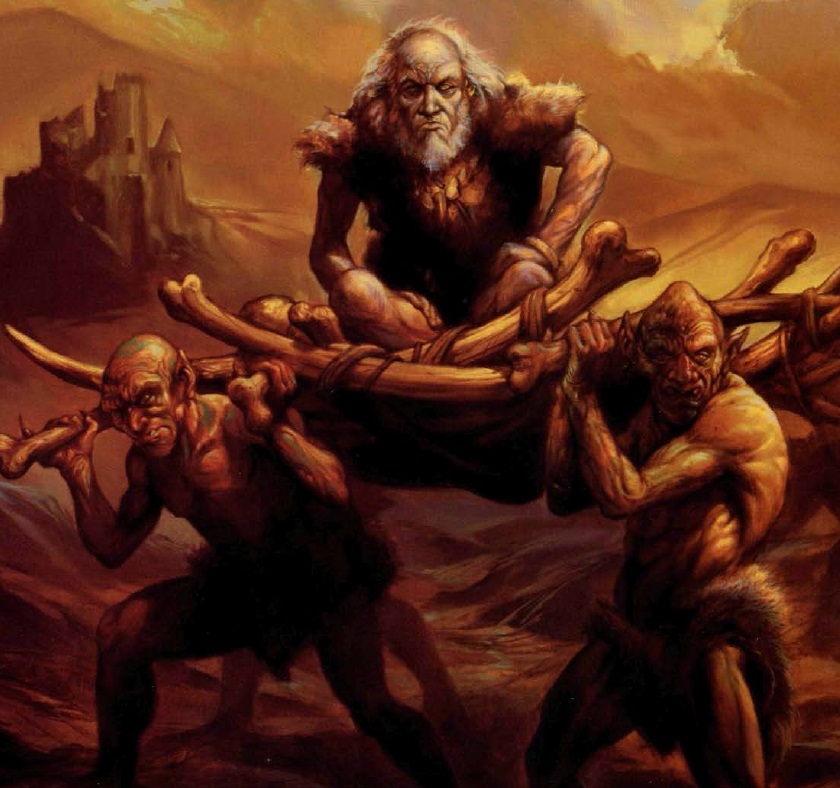Well, there aren’t any. At least none I am aware of. They’ve maybe published a dozen clerics across all of 5e adventures?
Exactly. Which is why we are at what I said several posts ago. "We don't know if Yeenoghu got a promotion or not."
Do we have literally any reason to believe that a statblock meant for someone worshiping a demon lord doesn’t get included when discussing people who worship a demon Lord?
It isn't mean for or not meant for one. We just cannot assume that Yeenoghu has any. We can only assume, that since he has a cult, there must be cultists. The spellcasting type is not required for a cult, so cannot be assumed. A DM is of course free to include them in a Yeenoghu cult if he wants, but what individual DMs do is not what is under discussion here.
This is like literally asking for an official document saying that Kings have knights in their service, it is heavily implied by the entire concept of knighthood.
Not all kings had knights. Knighthood is a European concept and not all kings were European.
Right, so he was weaker than Iuz and still worshiped as a god. Oh, wait, you think summoning Demons somehow means that people won’t worship him? There is zero reason to believe that, because many Evil Gods are reported to have various fiends in their service. This is just par for the course. ESPECIALLY, since demonic worship is a thing we know exists in DnD.
Yes. Being a DEMON and summoning DEMONS to MURDER and SUBJUGATE people does mean that most will not worship him. Fear yes, worship no. He'll have a small cult of insane people who would worship a demon, but that's it.
Sure, but that doesn’t mean that they didn’t miss things. In fact, SCG is often brought up as a departure from 5e design. So, it is worth noting.
I seem to have missed all of those threads. This is the first time that I've heard that.
You do realize that the wiki’s are pulled from official sources, right? And generally kept updated to the current edition.
You do realize that wikis have incorrect information quite often, right? Many professors won't allow wikis to be used on papers for that reason.
But, hey, you looked at a nearly 20 year old book for Third edition, so clearly that shows how 5e has changed things, right?
I don't have a 4e book to look at, so that was the most recent book I have access to.
Can you find any reference in 5e that has listed them as demigods instead of Lesser Gods?
Um...............................that's the entire point that I've been freaking making to you this entire freaking time. WE DON'T KNOW WHAT RANK THEY ALL ARE.
You're now arguing my point to me in order to refute that exact point.

Additionally, since The Red Knight and the others can hear and answer prayers, they aren’t Demigods according to the 5e DMG.
I see nothing that says that The Red Knight grants spells. It does mention priests in her write-up, but not all priests cast spells. From the Acolyte background.
"You have spent your life in the service of a temple to a specific god or pantheon of gods. You act as an intermediary between the realm of the holy and the mortal world, performing sacred rites and offering sacrifices in order to conduct worshipers into the presence of the divine. You are not necessarily a cleric - performing sacred rites is not the same thing as channeling divine power.
Choose a god, a pantheon of gods, or some other
quasi-divine being from among those listed in appendix B or those specified by your DM, and work with your DM to detail the nature of your religious service. Were you a lesser functionary in a temple, raised from childhood to assist the priests in the sacred rites?
Or were you a high priest who suddenly experienced a call to serve your god in a different way? Perhaps you were the leader of a small cult outside of any established temple structure,
or even an occult group that served a fiendish master that you now deny."
So there's a lot to unpack there. First, you can be a priest and not a cleric. Note how not only can you be a priest, but you can even be a non-spellcasting high priest. Second, you can be a priest or high priest of a quasi-divine being, which includes demigods like The Red Knight. Third, it says that the list in appendix B has quasi-divine beings, which means that demigods are on that list, despite being called gods. Fourth, outside of gods and quasi-divine beings, it beings up another group.............................fiends.



